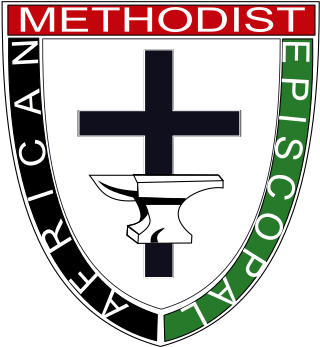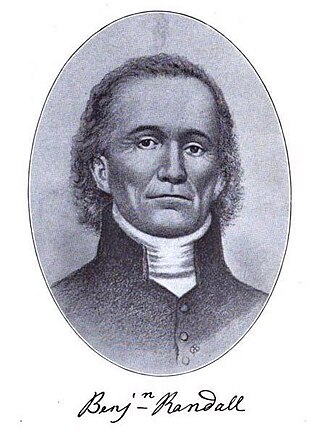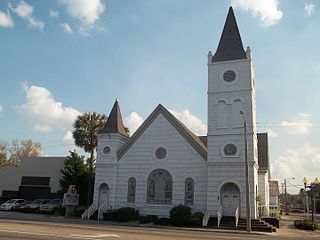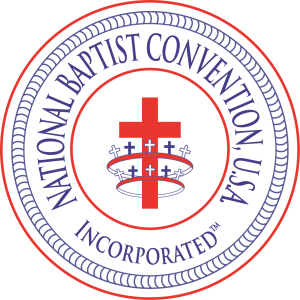The Methodist Episcopal Church, South was the American Methodist denomination resulting from the 19th-century split over the issue of slavery in the Methodist Episcopal Church (MEC). Disagreement on this issue had been increasing in strength for decades between churches of the Northern and Southern United States; in 1845 it resulted in a schism at the General Conference of the MEC held in Louisville, Kentucky.

The African Methodist Episcopal Church, usually called the AME Church or AME, is a Methodist denomination based in the United States. It adheres to Wesleyan–Arminian theology and has a connexional polity. It cooperates with other Methodist bodies through the World Methodist Council and Wesleyan Holiness Connection.
Two-Seed-in-the-Spirit Predestinarian Baptists are part of a larger sub-group of Baptists that is commonly referred to as "anti-mission" Baptists. This sub-group includes the Duck River and Kindred Baptists, Old Regular Baptists, some Regular Baptists and some United Baptists. Only a minuscule minority of Primitive Baptists adhere to the Two-Seed doctrine. The primary centers of Two-Seedism were in Northern Alabama, Arkansas, Eastern Tennessee, Florida, Georgia, Illinois, Indiana, and Texas. As of 2002, five churches or congregations of this faith and order still existed in Alabama, Indiana, Tennessee, and Texas.
The Six-Principle Baptists is a Baptist Christian denomination in United States.
Organized in 1951 as the Interstate and Foreign Missionary Baptist Associational Assembly of America, this group is now known as the Interstate and Foreign Landmark Missionary Baptist Association of America. Their purpose is to encourage fellowship among Missionary Baptist churches that practice ministerial support by freewill offerings. Since they do not believe in stipulated salaries for pastors and missionaries, they are also known as "Faithway Baptists".
A United Free Will Baptist is a member of either of two African-American Free Will Baptist denominations: the United American Free Will Baptist Church or the United American Free Will Baptist Conference.
The United American Free Will Baptist Church is the oldest national body of predominantly black Free Will Baptists in the United States.

Free Will Baptists or Free Baptists are a group of General Baptist denominations of Christianity that teach free grace, free salvation and free will. The movement can be traced to the 17th century with the development of General Baptism in England. Its formal establishment is widely linked to English theologian Thomas Helwys who led the Baptist movement to believe in general atonement. He was an advocate of religious liberty at a time when to hold to such views could be dangerous and punishable by death. He died in prison as a consequence of the religious persecution of Protestant dissenters under King James I.
The National Association of Free Will Baptists (NAFWB) is a national body of Free Will Baptist churches in the United States and Canada, organized on November 5, 1935 in Nashville, Tennessee. The Association traces its history in the United States through two different lines: one beginning in the South in 1727 and another in the North in 1780. The "Palmer line," however, never developed as a formal denomination. It consisted of only about three churches in North Carolina. The NAFWB is the largest of the Free Will Baptist denominations.

Converge, formerly the Baptist General Conference (BGC) and Converge Worldwide, is a Baptist Christian denomination in the United States. It is affiliated with the Baptist World Alliance and the National Association of Evangelicals. The headquarters are in Orlando, Florida. The current president of Converge is John K. Jenkins.

The Progressive National Baptist Convention (PNBC), incorporated as the Progressive National Baptist Convention, Inc., is a Baptist denomination emphasizing civil rights and social justice. The headquarters of the Progressive National Baptist Convention are in Washington, D.C. Part of the Black church tradition, since its organization, the denomination has member churches outside the United States, particularly in the Caribbean and Europe. It is a member of the National Council of Churches and the Baptist World Alliance.

The National Missionary Baptist Convention of America (NMBCA), also known as the National Missionary Baptist Convention (NMBC), is a predominantly African American Baptist Christian denomination. Headquartered in Dallas, Texas, the National Missionary Baptists—claiming continuity as the convention of R.H. Boyd—were formed in 1988. The convention is currently led by Dr. Anthony Sharp, I as president.

The National Baptist Convention of America International, more commonly known as the National Baptist Convention of America or sometimes the Boyd Convention, is a Christian denomination based in the United States. It is a predominantly African American Baptist denomination, and is headquartered in Louisville, Kentucky. The National Baptist Convention of America has members in the United States, Canada, the Caribbean, and Africa. The current president of the National Baptist Convention of America is Dr. Samuel C. Tolbert Jr. of Lake Charles, Louisiana.
General Baptists are Baptists who hold the general or unlimited atonement view, the belief that Jesus Christ died for the entire world and not just for the chosen elect. General Baptists are theologically Arminian, which distinguishes them from Reformed Baptists. Free Will Baptists are General Baptists; opponents of the English General Baptists in North Carolina dubbed them "Freewillers" and they later assumed the name. General Baptist denominations have explicated their faith in two major confessions of faith, "The Standard Confession" (1660), and "The Orthodox Creed" (1678).

The International Pentecostal Holiness Church (IPHC) or simply Pentecostal Holiness Church (PHC) is an international Holiness-Pentecostal Christian denomination founded in 1911 with the merger of two older denominations. Historically centered in the Southeastern United States, particularly the Carolinas and Georgia, the Pentecostal Holiness Church now has an international presence. In 2023, the denomination released a report showing 1,691,750 members outside the United States, Canada and Brazil. Worldwide figures are estimated at around 2 million members.

The Black church is the faith and body of Christian denominations and congregations in the United States that predominantly minister to, and are also led by African Americans, as well as these churches' collective traditions and members.

Historians generally agree that the religious life of African Americans "forms the foundation of their community life". Before 1775 there was scattered evidence of organized religion among Black people in the Thirteen Colonies. The Methodist and Baptist churches became much more active in the 1780s. Their growth was quite rapid for the next 150 years, until their membership included the majority of Black Americans.

The National Baptist Convention, USA, incorporated as the National Baptist Convention, USA, Inc., and more commonly known as the National Baptist Convention, is a Baptist Christian denomination headquartered at the Baptist World Center in Nashville, Tennessee and affiliated with the Baptist World Alliance. It is also one of the largest predominantly and traditionally African American churches in the United States, and was the second largest Baptist denomination in the world in 2016.
The Global Methodist Church is a Methodist denomination within Protestant Christianity subscribing to views that were propounded by the conservative Confessing Movement. The denomination is headquartered in the United States and has a presence internationally. The Global Methodist Church was created as a result of a schism with the United Methodist Church, after members departed to create a denomination seeking to uphold "theological and ethical Christian orthodoxy."











